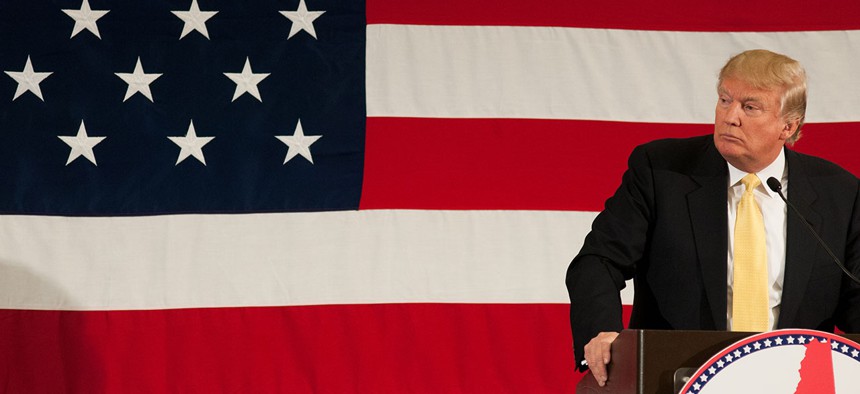
Andrew Cline / Shutterstock.com
The Donald Trump Conundrum
How should his Republican rivals handle him at the debate? And who might inherit his supporters?
August is arriving, and we are entering week six of Donald Trump's rise—first into the double digits, now into first place—in the national polls for the Republican presidential primary race. While there are few if any experienced GOP pros or political reporters who think Trump can actually win the nomination, it's hard to argue with where he is right now. Even after his unfortunate remark questioning the heroism of Sen. John McCain—who was held captive and tortured for five and a half years in a North Vietnamese prisoner-of-war camp while Trump cooled his heels stateside on one draft deferment after another (student, then medical)—the bombastic real-estate mogul remains at the head of the Republican pack.
Donald Trump talks to the media during his trip to Laredo, Texas, July 23, 2015. (Matthew Busch/Getty Images)The fact that Trump's very conservative, anti-immigration, militantly anti-establishment, and—most important—angry backers never cared much for the independent and sometimes-moderate McCain helps to explain why the comment had so little effect on the businessman's poll numbers. But the McCain incident also suggests that, while Trump's candidacy is almost certainly destined to fail, he is less likely to pop like a balloon than to deflate gradually, like a car tire with a leak. Republican pollsters and strategists privately suggest that his trajectory will resemble a bell curve: a roughly symmetrical rise and fall, much like those then-Rep. Michele Bachmann and businessman Herman Cain experienced in 2011.
Chris Cillizza, who writes The Washington Post's feature "The Fix" (and is a former colleague of mine), highlighted the essence of the Trump message by pointing to a remark made by billionaire businessman, Dallas Mavericks owner, and Trump supporter Mark Cuban: "I don't care what his actual positions are. I don't care if he says the wrong thing. He says what's on his mind. He gives honest answers rather than prepared answers. This is more important than anything any candidate has done in years."
That comment not only boils down Trump's appeal, it also highlights the question faced by the nine Republicans who will share the stage with Trump on August 6 in Cleveland: How do you handle someone like this in a debate? Earlier this week, Taegan Goddard's website, Politicalwire.com, published as the quote of the day a tweet by John Weaver, who was a top aide to the 2008 McCain campaign and is working with Ohio Gov. John Kasich's campaign this time around. In it, Weaver describes the dilemma: "Imagine a NASCAR driver mentally preparing for a race knowing one of the drivers will be drunk. That's what prepping for this debate is like." (While it is unclear whether Kasich will make the cut to be included in the debate, Weaver's analogy is apt.)
So how should the rest of the GOP field handle the debate? All of them would probably benefit from following the vulgar but apt Southern advice, "Don't get into a pissing match with a skunk." My hunch, however, is that the strategies of former Gov. Jeb Bush and Sen. Marco Rubio of Florida, both of whom are certain to be among the top-10 candidates in the national polls, and both of whom come from the more conventional and mainstream wing of the party, will be very different from those of the candidates from the more exotic wing of the GOP. (It should be noted that, while Rubio was elected to the Senate in 2010 as a tea-party candidate, in Washington he has pursued a more conventional, buttoned-down approach.)
For Bush and Rubio (and Kasich if he makes the cut), the best advice would probably be to stay out of Trump's way. Focus on making a positive impression on—and hopefully connecting with—Republican primary voters and caucus attendees. Each of them should have a game plan for achieving those goals and stick to it, almost no matter what Trump does. Approximately 60 percent of GOP primary voters belong to that more conventional wing of the party—and while that number is lower in Iowa, it is still not low enough to make it sensible for these candidates to court the anger crowd.
But for Sen. Ted Cruz, Ben Carson, former Gov. Mike Huckabee, Sen. Rand Paul, former Texas Gov. Rick Perry, and, if he makes the cut, former Sen. Rick Santorum—all of whom are running from a distinctly more ideological wing of the party—a wise strategy would be not only to follow the aforementioned advice but also to demonstrate enough anger that they plausibly stand to inherit Trump's supporters if he does start to drop in the polls.
When asked which candidates might logically benefit if—or, more likely, when—Trump deflates, some smart and unaffiliated Republican strategists homed in on two: Cruz and New Jersey Gov. Chris Christie. While on the surface they are very different people, Cruz and Christie both arguably channel anger more effectively than their rivals and might be able to tap into that energy if Trump starts bleeding support. Cruz articulates an extremely conservative, anti-Washington form of anger. Christie's ire is not quite so ideological but still pretty conservative, and he vents it well; as with Trump, no one ever accused Christie of pulling his punches. Although others might be able to latch onto some Trump defectors—polls suggest he has drawn support away from at least four or five of his rivals—these two seem like pretty logical beneficiaries of a Trump exit. Which could make next week's debate an especially important one for them.
(Image via Andrew Cline / Shutterstock.com )






